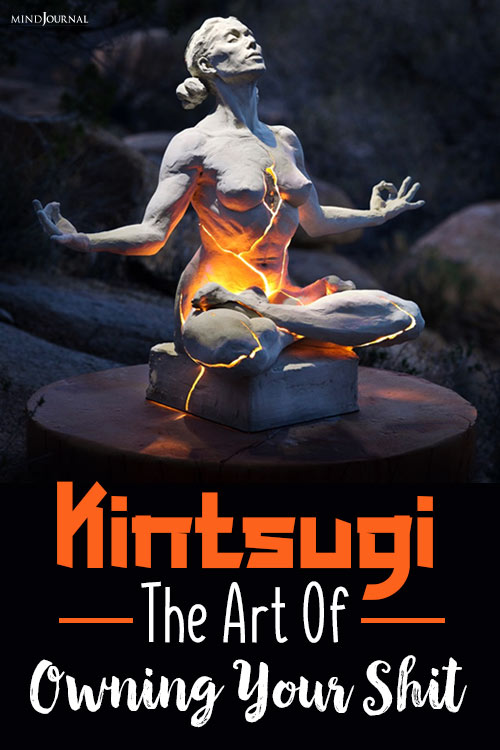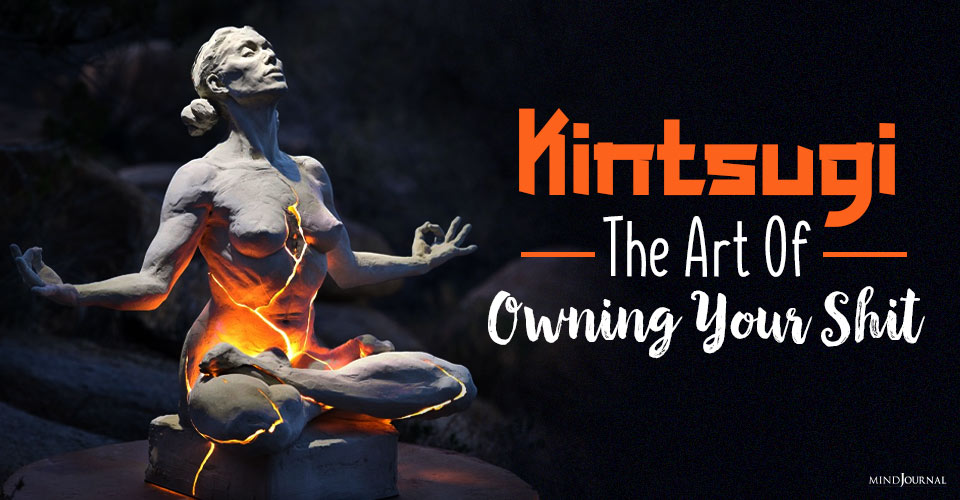The Japanese Kintsugi philosophy can help us so much when it comes to owning our shit. The Kintsugi art can help you embrace your damage and love your imperfect self. So, what is Kintsugi really? And how can it help you and the relationship you’ve with your partner?
What is Kintsugi?
Knowing how to “own our shit” is essential to our romantic relationships. You see, what I know to be true as a couples therapist (and a wife) is that it tends to be really easy to figure out what our partners are doing that feels disappointing, annoying, or hurtful.
But it tends to be quite a bit harder to figure out what WE are doing that is disappointing, annoying, or hurtful. In love, it takes two to tango… always. And the problem is that when we focus on pointing out to our partner how he or she is being a jackass, we get nowhere.
Rather than helpful dialog or loving connection, criticizing our partners for their shit instead yields counter-complaining (“yeah but you…”) and defensiveness (“what’s the big deal? You’re overreacting”). However, when we are ready, willing, and able to take responsibility for our part of the dance, we tend to be able to move through conflict much more effectively.
And when we are ready, willing, and able to take responsibility for our part of the dance, conflict actually becomes a vehicle for intimacy—a path to both greater self-awareness and greater connection with our partner. But how exactly do we own our shit?
There’s one, hands-down, essential ingredient that is needed in order to take responsibility for ourselves in the service of our intimate relationship. That ingredient is SELF-COMPASSION. Self-compassion is the practice of being on our team. Self-compassion is about treating ourselves with love and kindness.
Related: Self-Compassion And Meeting Yourself Where You Are
And the degree to which I can be gentle and forgiving with myself is the degree to which I can own my shit. When I am practicing self-compassion, I can be open with my partner about the fact that I am both deeply imperfect and deeply worthy of love.
(For the full scoop on self-compassion, check out the work of Dr. Kristin Neff. She’s the self-compassion guru!) The metaphor that for me best captures the heart of self-compassion is KINTSUGI.
Kintsugi is a Japanese ceramics technique that involves taking a shattered piece of pottery and using molten precious metal to hold the parts together again. A few years ago, a graduate student used this image to capture her sense of who she is in the world.
It was one of the more touching metaphors I have ever heard, so I have continued to use it in my teaching and writing. Each and every one of us deserves to feel pride in our imperfections and strength in our broken places. Hard as it may be to believe, our vulnerabilities are what make us beautiful.
Accepting and embracing our imperfections opens the door to a stronger and more intimate romantic relationship.
So smitten am I with this metaphor that I decided to create some kintsugi for this blog post. I enlisted the help of my 11-year-old daughter and her sister-from-another-mother.
What fun we had smashing pots and making them beautiful and whole! I am in love with the outcome of our work, but I am more touched by the process of our work.
Here are a couple of thoughts I had as we created these pieces.
Kintsugi and the Art of Owning our Shit
First, if the putting together of broken pieces represents a healing journey, I was reminded that healing with compassion is a longer and more delicate process. Instead of just applying glue and sticking the pieces back in place, we moved slowly and intentionally with the gold paint.
Each corner and straight edge needed our time and attention. Then we needed to wait. And then we needed to use glue. The long way was the beautiful way. And “success” was not about hiding the cracks.
Success was about bringing loving attention to them. As we moved through this process, I was thinking about my work as a therapist. Clients often want to just quickly stick their broken pieces together as quickly as possible—“how do I stop being like this?” “Help me be different.”
But lasting and loving change happens only when we take the time and care to understand and tend to all of the places that hurt. Pain doesn’t stop simply because we will it away. Pain transforms with loving attention.

Second, as we sat in the yard working on these pieces of art, I realized that I had not played creatively in a long time. It felt glorious to use my hands in this way. Creativity is inherent in each and every one of us, and the act of creating is healing, and creative play is an essential aspect of our emotional wellbeing.
No matter the vehicle—building, gardening, drawing, singing, painting—making time and space for creative play feeds the soul as nothing else can!
So there you have it. Kintsugi is a metaphor for owning our shit with love…. for the sake of our intimate relationships. In case you needed a little more convincing, I will bring your attention to the fact that a kintsugi bowl made a cameo appearance in Beyonce’s Lemonade visual album.
Related: Why You Should Forget a Soulmate and Find a Weirdmate
This means that for all of the ways that Beyonce is different from the rest of us (talent, beauty, style, need I continue?), there is a thread that connects us all. Each and every one of us is strong and worthy in our broken places.
When we approach our romantic relationships believing this to the core, it is far easier to own our shit. With accountability. With courage. With humility. Our long-term happiness in love rests upon our willingness to do so.
Want to know more about kintsugi pottery and how it can help us own our shit? Check this video about kintsugi art below!
Written By Alexandra Solomon Originally Appeared On Dr. Alexandra Solomon
Frequently Asked Questions (FAQs)
What does kintsugi symbolize?
Kintsugi is the Japanese art of repairing broken pottery and bringing them back together with molten gold. It symbolizes the importance of embracing your imperfections and flaws and accepting yourself with all your broken pieces.
What is the difference between wabi-sabi and kintsugi?
Kintsugi repairs the broken pieces of something and the cracks become an important part of its identity and beauty. Wabi-sabi on the other hand encourages you to accept your imperfections, instead of trying to hide them.
What does kintsugi teach us about life?
The Japanese art of Kintsugi teaches you that your broken pieces make you more beautiful, and stronger. Having the ability to pick up the pieces, put them back together and embrace them takes a lot of strength.










Leave a Reply
You must be logged in to post a comment.